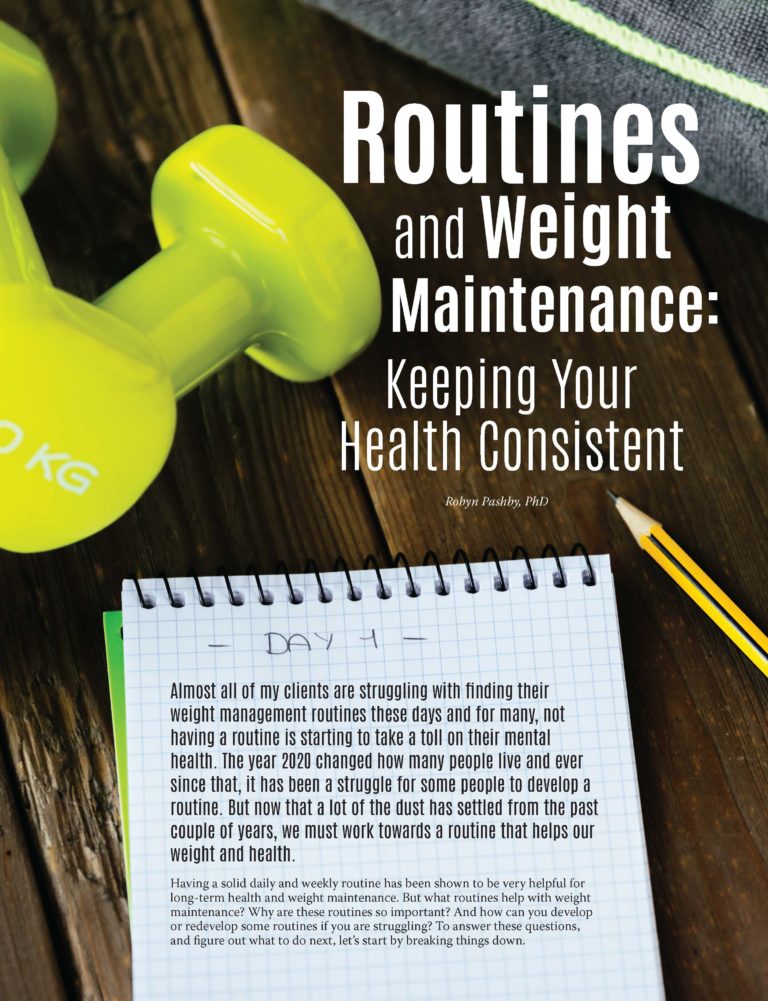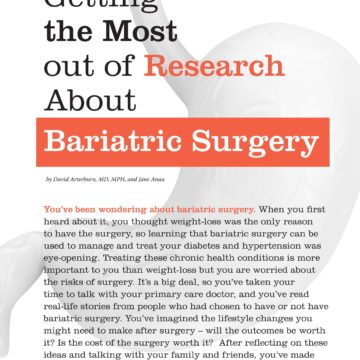Routines and Weight Maintenance: Keeping Your Health Consistent


Robyn Pashby, PhD
Summer 2022
Almost all of my clients are struggling with finding their weight management routines these days and for many, not having a routine is starting to take a toll on their mental health. The year 2020 changed how many people live and ever since that, it has been a struggle for some people to develop a routine. But now that a lot of the dust has settled from the past couple of years, we must work towards a routine that helps our weight and health.
Having a solid daily and weekly routine has been shown to be very helpful for long-term health and weight maintenance. But what routines help with weight maintenance? Why are these routines so important? And how can you develop or redevelop some routines if you are struggling? To answer these questions, and figure out what to do next, let’s start by breaking things down.
Primary and Secondary Routines
A routine can be defined as “a repeated behavior involving a momentary time commitment task that requires little conscious thought” (Arlinghaus and Johnston, 2018). It can be helpful to think about our routines in two broad categories. We all have what scientists categorize as “primary” and “secondary” routines. Primary routines are those that are important for keeping us alive and meeting our basic biological needs.
Examples of primary routines include sleeping, eating, and personal hygiene. Our secondary routines are those that reflect our individual preferences and motivations and include our hobbies, exercise, work/study, and how we spend our leisure and social time.
Weight management and maintenance behaviors, of course, span across both our primary and our secondary routines. In terms of our primary routines, eating behaviors are important for managing weight over the long run. In fact, when researchers track the behaviors of people who maintain their weight-loss, they find that planning meals most days of the week and tracking calories and fat are commonly reported routines.
Among secondary routines, regular daily exercise (most often walking, but also weight lifting) was high on the list, along with cooking for fun (Kruger et al., 2006). When examining the psychological or mental strategies of those maintaining weight-loss, the regular practice of psychological coping skills, positive and encouraging self-talk, mindfulness practice, and self-kindness was reported to be significantly higher (Phelan et al., 2020).
Creating Healthy Behaviors
So now we know what routines are most helpful for weight-loss maintenance. But why are such routines so important? In short, they help make health behaviors automatic. Routines are things you do over and over again and the more you practice them, the more automaticity that is created. When something feels automatic, it requires less and less intentional effort over time, making it feel easier. Therefore, routines are helpful and important because they lower the amount of effort required to do the things you want to do. We’re all busy and often overwhelmed so the less effort required to do the things we want to do, the better.
On the flip side, the more disjointed your routines are, the more effort required to engage in the behavior and the higher the stress you likely feel. People without routines spend a lot of time thinking about, planning for, and worrying about doing (or not doing) healthy behaviors. All that worrying, planning and thinking increases stress because stress increases when there is less predictability and controllability (Koolhaas et al., 2011). Stress negatively impacts both physical and mental health, but here’s the good news, routines restore a sense of normalcy, controllability, and predictability. Lower stress improves physical and mental health and it makes engaging in health behaviors easier.
Picking a Routine
Let’s go back to the data and pick one or two of those well-established healthy routines that are known to support weight maintenance we reviewed earlier in this article. Has meal planning or food tracking historically helped you? Or are you someone who loves to walk? Or would you rather work on your psychological coping skills and self-talk? It really doesn’t matter what you choose– just pick one from the list we reviewed earlier and go for it. The data support all of those different routines for weight maintenance, so you can feel free to select the one that feels most doable to you now and just get started.
You’ll notice I said, “pick one” and get started. I didn’t say, “do a total reset starting tomorrow!” I challenge you to tune into your automatic thoughts on this topic and search for your brain’s tendency to want to go all-in on routines. While you may know that building up to routines is the sustainable way to make changes, the emotional urgency to make all the changes at once can be quite powerful, especially if you have been struggling.
When we really dig in during a one-on-one session, I’ve had more than one client tell me that despite what they know (e.g., small changes matter), somewhere deep inside, they have grand notions of cocooning themselves for a period of time and then reentering life at some future point once they have transformed into a metaphorical butterfly (i.e., big changes are what they really, really want). Yet research consistently demonstrates that “too much change, too fast” is likely to end without positive results (Arlinghaus and Johnston, 2018). In other words, pay attention to how much you take on at a time. Go slow, take it one step at a time, and let your routines build over time. Put your routines together like pieces of a puzzle. One by one the pieces will come together and eventually, they will form a beautiful whole.
What Happens When you get Bored?
In my many years of practice, clients have said that they get bored doing the same things over and over again and they blame boredom for interfering with their healthy routines. To this point, I encourage you to consider two main points: a) flexibility within your routine and b) values-oriented connection. We’ll start with the values and work backward. Barbalet (1999) taught us that boredom is experienced when one lacks a sense of meaning or purpose in their activities.
Let’s use the case of a daily walking routine as an example. When you start out, walking feels important to you on your weight-loss journey and you may regularly consider how good you feel, how much your mobility has improved, and how important it is for you to be active to lose and maintain your weight-loss so you can engage in life differently. Over time, however, your thoughts may wander and the links between this routine behavior (your daily walk) and the original purpose (weight, health, mobility and feeling good goals) may weaken or lose their sharpness. This loss of connection to purpose may be particularly true when shifting from weight-loss to weight maintenance when the reward of the scale going down has disappeared. Suddenly, you feel bored. This example helps us understand why it is so important to consistently and consciously think about how our health behaviors connect to our purpose, goals and values (meaning). Taking charge of your self-talk and making consistent efforts to align your values with your action will keep your actions meaningful and reduce boredom.
Remember, though, that you can and do have the option of mixing things up within your routines! As long as you keep your values at the forefront of your mind, let yourself be flexible in how you get there. If you value being active, for example, so you can more easily play with your kids or your dog, then it doesn’t really matter if you shift from your daily walking routine to a weight lifting routine to playing pickleball or taking a weekly salsa class. Whatever you feel like doing at that point in your life is fair game. Flexibility is the key to the consistency of routine. In other words, you don’t have to do the same thing for the rest of your life to keep working towards a valued goal.
What Happens if I Slip Up?
Do you need to be perfect in sticking to your new routine? Must you do it every day without fail to really create a routine? Do you have to be perfect for 30 days, 45 days, 66 days, or some other magic number of days to really make a routine ‘stick?’ I’m glad you asked! The short answer is no! Researchers remind us that “occasional non-adherence to a behavior will not derail the progress made to creating the routine, and perfect adherence does not need to be a goal or expectation” (Arlinghaus and Johnston, 2018).
Make Sure You Chose Wisely!
In this article, I have reviewed what routines researchers have told us are most helpful for weight maintenance, including both behavioral and mental strategies, and I examined why these routines matter. But every person is unique and you know yourself best. So tune into yourself and always remember that managing and maintaining weight is about so much more than just what you eat and how much you move. And at times, when you feel overwhelmed, look to your routines as one way to reduce the overall cognitive and emotional load of this work so you can stay aligned with your values. By choosing routines that matter to you, you’ll be sure to choose wisely!
About the Author:
Dr. Robyn Pashby, PhD, is a clinical health psychologist, a passionate member of OAC, and someone who has both personal experience with and a family history of obesity. Professionally, Dr. Pashby has spent the last 15 years incorporating mental health care into obesity treatment in a variety of multidisciplinary settings and most recently in her own behavioral health group practice. She loves seeing individual clients and has led numerous groups over the years, including ongoing support groups to help people manage binge eating and to adjust to life after bariatric surgery. When not in session with a client, Dr. Pashby is working to reduce both mental health and weight bias by educating other psychologists, psychiatrists, physicians, personal trainers, physical therapists, and other clinical healthcare workers on how these biases harm their patients. She lives in Washington, DC with her family and their dog, and she loves to spend her time outside in nature, listening to alt-country or 80s music, or traveling the world. She looks forward to bringing a richer mental health focus to the OAC’s excellent work.
by Yelena Kibasova Spring 2024 The fitness world is evolving, with new trends and innovations that promise…
Read Articleby Kendall Griffey, OAC Communications Manager Spring 2024 We have officially kicked off Your Weight Matters Regional…
Read Articleby Robyn Pashby, PhD Winter 2024 “No one is ever going to date you if you don’t…
Read Article








